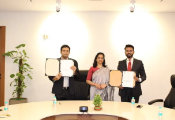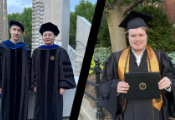Investing in Quantum Technology Fellowships for Future Success
April 14, 2025 -- The Engineering and Physical Sciences Research Council (EPSRC) awards 11 emerging UK research leaders with a Quantum Technology Career Acceleration Fellowship.
The Quantum Technology Career Acceleration Fellowships recognise the most promising early career researchers in the UK and support them to develop their careers and push the boundaries of their field.
EPSRC is investing £15 million in total.
This will support research into topics such as:
- investigating new platforms and protocols for quantum imaging, sensing and computing
- advancing methods for quantum error correction and mitigation
- advancing materials research and technologies for quantum applications
- exploring fundamental scientific principles underpinning quantum technologies
- new theoretical and algorithmic approaches to creating robust and scalable quantum models
- redefining how superconductors are understood and optimised to pave the way for advances in quantum technologies
Incredible potential of quantum
EPSRC’s Quantum Technology Career Acceleration Fellowships provide a platform for talented researchers at UK universities and encourage bright minds to contribute to the UK’s quantum ambitions.
Encouraging bold thinking and boosting quantum skills, through the next generation of leaders, will ensure the UK can realise the incredible potential of new quantum technologies.
Leadership, innovation and inclusivity
The fellowships are designed to accelerate researchers’ careers and fast track them towards world-leading positions in the future, ensuring the UK maintains its position as a global force in quantum technology.
The investment in emerging leaders provides them with an invaluable opportunity to advance responsible research and innovation, making it more inclusive and equitable.
In doing so, fellows will contribute to a vibrant and interconnected UK quantum technologies community and will champion various aspects including:
- challenging the socioeconomic bias in academic systems
- encouraging greater inclusivity of neurodiverse individuals and other underrepresented groups
Fellows will also support innovation activities to deliver growth in the sector and maximise opportunities to build connections with industry and end-users, reducing the gap between research and commercialisation.
Advancing quantum computing
This technology will make it possible to connect a number of smaller quantum computers to a larger system while maintaining their quantum properties and achieve more powerful quantum computers sooner.
This is similar to how many smaller classical computers can be connected to form a supercomputer.
Dr James Seddon at University College London aims to enable scalable superconducting qubits using photonic terahertz (THz) frequencies for quantum control, allowing higher-temperature operation in compact cryocoolers.
Current superconducting based quantum computers’ ability to scale can be limited by environmental limits like temperature.
This research provides a solution to overcoming these limits.
Pushing the boundaries
Quantum computers hold immense potential when applied to areas such as advanced materials development and drug discovery, cryptography and optimisation.
However, the single biggest bottleneck that prevents the scaling of a practical quantum computer is the errors in quantum machines.
Dr Joschka Roffe at The University of Edinburgh will lead a team dedicated to developing new quantum error correction strategies tailored for near-term devices.
Dr Roffe will work closely with academic collaborators, the National Quantum Computing Centre and industry partners.
Unlocking the potential
To fully harness the potential of emerging technologies, future quantum networks are envisaged as clusters of quantum processors interconnected and integrated with existing network infrastructure.
These networks will not only advance technological capabilities but also provide enhanced security.
Realising this vision will require fundamental research and engineering challenges to be overcome.
Dr Tobias Franzen at Durham University will be looking at quantum networking at telecom wavelengths with ytterbium (Yb) qubits.
Arrays of these qubits have emerged as a promising platform for quantum computing, quantum sensing and quantum communications.
Real-world applications
Quantum sensing-enabled solutions can have a huge impact on the quality of human lives.
To deliver on the opportunities presented by quantum technologies, and improve the sensing quality, the requirement to apply the technology to real world problems and demonstrate use cases is equally important.
Dr Joe Smith at The University of Sheffield plans to advance semiconductor tools to make solid-state quantum sensors accessible outside research labs.
This will be achieved by exploiting microelectronics to process information at unprecedented efficiency, routing information with photonics, and using robotics to sensitise these systems.
This will put the sensors into the hands of practitioners for precision in disease diagnosis and chemical analysis.
Supporting bold thinking
Secretary of State for Science and Technology, Peter Kyle said:
"Quantum – manipulating the universe at its smallest scale – has the potential to save millions for our economy, create thousands of jobs and improve businesses across the country – stopping fraudsters in their tracks, protecting our bank accounts and more.
Backing our world-class quantum researchers and businesses is an important part of our Plan for Change.
The UK is home to the second largest community of quantum businesses in the world and this investment means they can go further paving the way for new quantum tools and products that make our lives easier, fuel growth, and help us tackle the great challenges of our era."
World leading capabilities
EPSRC Executive Chair Professor Charlotte Deane said:
"These awards highlight the diversity of our quantum technologies portfolio and amplify the importance of technological integration to deliver world leading capabilities for the UK.
The Quantum Technologies sector is rapidly growing and evolving, so building a diverse and thriving workforce that can drive this forward is vital to unlocking economic and societal benefits in the future.
By investing in the most promising researchers, not only are we boosting quantum skills, but we are also strengthening the research base and ensuring the UK can realise the incredible potential of new quantum technologies."




































